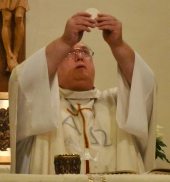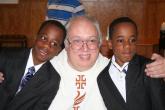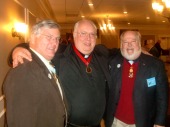Many years ago, when I was a seminarian, I recall a class discussion over Luke 2:51-52:
“He went down with them and came to Nazareth, and was obedient to them; and his mother kept all these things in her heart. And Jesus advanced in wisdom and age and favor before God and man.”
The context was the tension between the theological school of Antioch that emphasized the humanity of Christ with the school of Alexandria that focused upon his divinity. The latter school stressed John 1:1-3:
“In the beginning was the Word, and the Word was with God, and the Word was God. He was in the beginning with God. All things came to be through him, and without him nothing came to be.”
The biblical verse from Luke substantiated the claims of Antioch. However, it seemed to fly in the face of the Church’s discernment that Jesus Christ was a divine person, albeit with two natures. While Jesus could certainly grow in age regarding his humanity, how could he really advance in wisdom and grace or holiness? While we should be careful about presumptions toward the mind or psychology of Christ, it must be held that as God he assuredly knew all things. It would be absurd to imagine him as an amnesiac deity. He knew from the womb who he was and his mission. The best we can figure, so as not to destroy his human “experiential” knowledge, he must have pocketed or set aside the fullness of divine knowledge or awareness. It was always there, but like a book that needed to be taken off a shelf.
An analogy can be made as to how we all know things. While we can call upon our many memories and knowledge, it is an element of human psychology that we do not focus upon everything at once. We concentrate on a few things or what we need at any given moment. I suspect it was the same for the incarnate Christ. However, when there was a need, he could call upon his infinite divine knowledge, as he does in prophesying his passion and reading souls that he would heal and forgive. Thus, Jesus could have learned carpentry from his foster father Joseph, even though in his divine knowing, he could have built wooden television consoles. But Jesus is careful not to do anything that violates the parameters of his humanity that is situated in a particular culture within space and time. Further, the pocketing of his divine knowledge means that his experiential learning is real and that he is not a God pretending to be a human being. Both elements of his being are sustained although the tension would precipitate much confusion and debate in the Church.
More problematical is the fact that Jesus Christ is the source for all holiness. How can he possibly grow in grace? Again, looking at the rest of us, something of the solution emerges. When an infant is baptized it can be said that the holiest person in that family household is that child. Like Jesus, we get older, are instructed in the ways of our faith and we mature. We begin to manifest the fruits of faith and realize the graces received in the sacrament. Similarly, our Lord is the living sacrament and uncreated grace starting in the womb of Mary. Unlike us he will never forfeit or blemish his holiness through sin. His trajectory or life in holiness is perfect while ours will know detours with needed repentance and God’s mercy along the way.
Jesus always sees the heavenly Father (the beatific vision). As a child in the womb, as a baby in the manger, indeed, throughout his whole life there was never any confusion in his mind between his foster father Joseph and God the Father. It was in this sense that there was no ignorance or confusion in Christ.
Our Lord will realize before men who he is and why he has come into the world. His learning will amaze listeners and they will wonder where he received it. His presence will exude a welcoming and enriching grace that will attract many to him. The transition is from his hidden life as the son of Joseph and Mary to his public life as the Son of God come to save us. His ministry begins when he is thirty years old, not when he immediately emerges from the womb. It is fitting that he is like us in all things except sin. He knows what it is to grow up in a human family. He is one of us although he is also the second person of the Trinity, the one true God.
The Church teaches that the human and divine natures of Christ are perfectly joined in a hypostatic union (in one divine personhood). Jesus is both God and man, but he is a divine and NOT a human person. This is still the case— the incarnate Christ in heaven is forever God and man. What Christ is by way of identity, we can share by the indwelling of grace by which we as human persons are remade into the likeness of Christ by the intervention of the Holy Spirit.
Filed under: Uncategorized | Tagged: Bible, christianity, Church, God, Jesus | Leave a comment »















































